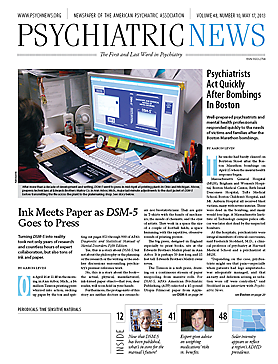For the past six years, the University of Tennessee Health Science Center (UTHSC) in Memphis has been holding an annual continuing medical education (CME) conference that attracts not only its own medical residents but also physicians and other health professionals from states throughout the region. The conference is run jointly by the Family Medicine and Psychiatry departments and focuses on topics in both of those fields.
This year’s program, held April 12 to 14, set an attendance record since the Department of Psychiatry was invited to present at the Department of Family Medicine’s long-running annual CME conference six years ago, James Greene, M.D., professor and chair of the Department of Psychiatry, told Psychiatric News. In addition to UTHSC faculty and students, who attended for free, the conference attracted 87 paid registrants from 12 states. Greene, who is also the Area 5 representative on the APA Board of Trustees, said he was pleased to see that the number of paid registrants showed a substantial increase from the 61 who attended last year.
“On [the day of highest attendance], we had 135 to 140 attendees,” said Greene. A few of the most popular sessions were standing room only. Two of the sessions that drew the largest crowds were “My Patient Is Crazy! Update on Acute Management of Delirium,” presented by Juan Jaramillo, M.D., and “My Patient Makes Me Crazy! The Psychology of Patient Resistance,” presented by Jody Long, Ed.D., L.C.S.W., and John Stoeckel, L.C.S.W.
The three-day conference offered 22 hours of CME credits for physicians. Nurse practitioners, physician assistants, and licensed clinical social workers also attended. The presenters as well as the attendees were divided pretty much equally between those working in family-medicine and those working in the mental health field. Based on the feedback and comments, Greene believes the conference was a success, and not just because two major areas of patient care were covered. The programs were not simply half about family medicine and half about psychiatric topics, he said. “We put together truly integrated programs on both [family medicine and psychiatry]…smooth and seamless.”
Included in this year’s program were topics on female sexuality, parasomnias, telepsychiatry, epigenomics, elderly care, diabetes, suicide, and palliative care with concerns on death and dying. During the program’s three days, only half a day was devoted to separate psychiatry and family medicine tracks. “The subjects are patient centered, not psychiatry– or family medicine–centered,” said Greene.
He emphasized that psychiatry and family medicine both gain from close collaborations such as this educational program. “Family medicine provides 8 percent of the care for psychiatric patients,” Greene pointed out, while psychiatrists can help general practitioners build better relationships with patients and consequently improve compliance with treatment and reduce potential liability risks. “We know how to listen to and talk to patients,” said Greene.
This year’s program was titled “Working Together Healing the Mind, Body, and Soul,” with the intent of helping move physicians and health professionals toward seeing and treating patients holistically. “You can’t divide a whole patient,” said Greene. “A patient is not just a liver or a disease,” and the mind and body cannot be treated separately.
The key to successful collaboration between psychiatry and other medical disciplines, Greene emphasized, is equal partnership. The annual Tennessee conference has been planned and executed with equal contributions in budget and responsibility between the two departments. “We have a fully collaborative relationship that binds us together,” Greene noted. “The [practitioners] come together and interact with each other for three days, and develop relationships.” These relationships then bloom into mutual trust and closer collaboration. “Ultimately it benefits patients,” he emphasized. “It promotes working together, and we win when that happens, especially in medicine.” ■
